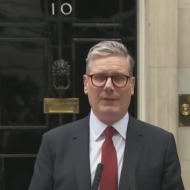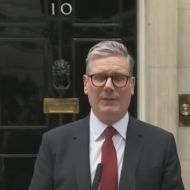
UK Prime Minister Expected to Allow Arrest Warrant for Netanyahu

The previous British government had submitted an amicus brief questioning ICC jurisdiction over Israeli nationals.
By United with Israel and David Isaac, JNS
British Prime Minister Keir Starmer is likely to withdraw the previous British government’s objection to the request of the International Criminal Court’s chief prosecutor to issue arrest warrants for Israeli Prime Minister Benjamin Netanyahu and Defense Minister Yoav Galant, the New York Times reported Thursday, citing two people briefed on the government’s deliberations.
The report comes after the ICC on Monday agreed to accept a large number of amicus briefs from both Israel’s friends and foes who want to weigh in on the ICC chief prosecutor’s May 20 request, following Britain initial objection.
Among the many on Israel’s side who will submit briefs are Senator Lindsey Graham (R-S.C,), UK Lawyers for Israel and the Simon Wiesenthal Centre.
Those opposed ranged from former U.N. Special Rapporteur Richard Falk to Al-Haq and Addameer, two of six Palestinian NGOs designated as terrorist organizations by Israel.
NGO Monitor will also submit an amicus brief.
Speaking to JNS in an interview published Thursday, NGO Monitor’s legal adviser Anne Herzberg said the ICC would have “rubber-stamped the application” of Chief Prosecutor Karim Khan for the arrest warrants if not for the reports in June that the United Kingdom would submit an amicus brief challenging the court’s jurisdiction.
The court wanted to keep the U.K.’s filing secret (a request Herzberg termed “ridiculous”), but the U.K. requested that it be made public.
If the Labour government had been in power at that time, it likely wouldn’t have submitted an amicus brief at all, Herzberg also noted.
The jurisdiction issue is important because Israel is not a signatory to the Rome Statute, which established the ICC. The court has claimed jurisdiction by accepting the “State of Palestine” as a signatory in 2015, even though no such state exists.
The Pre-Trial Chamber will look specifically at the question of whether the Oslo Accords—the agreements signed between Israel and the Palestine Liberation Organization in 1993 and 1995—bar the Palestinians from exercising jurisdiction over “Palestine.”
In 2020, NGO Monitor also submitted an amicus brief to the ICC over jurisdiction. That was in response to then-ICC Chief Prosecutor Fatou Bensouda’s request that the Pre-Trial Chamber confirm she had jurisdiction to open an investigation into the “Situation in Palestine.”
NGO Monitor argued in that brief, “There is no presently-existing ‘State of Palestine’ capable of referring matters to the International Criminal Court. A State that does not exist is not capable of delegating sovereign jurisdictional competencies to the ICC.
“Accordingly, the Court lacks jurisdiction with respect to the so-called ‘Situation in Palestine,’” NGO Monitor said.
The court decided to grant jurisdiction anyway, despite hostile NGOs submitting briefs with “highly flawed or invented legal arguments,” NGO Monitor said on its website.
The ICC is again looking at the issue of jurisdiction because the Pre-Trial Chamber wavered in its 2020 decision, concluding that there was basis to open an investigation, but the issue of jurisdiction and the Oslo Accords would need to be revisited at a later date if arrest warrants were pursued.
There was one dissent in the 2020 decision by president judge Péter Kovács, who wrote a 150-page brief concluding the ICC had no jurisdiction.
“He went through the record in very detailed fashion. And I think the other two judges just either didn’t have the capacity or were unwilling to grapple with the actual facts of the case. So they just kicked the can down the road,” Herzberg said.
She expects the court to find that it has jurisdiction this time around as well. “I don’t think it’s going to move the needle at all, frankly.”
Nevertheless, she said it was important for the historical record that Israel’s case be presented. Otherwise, it creates the impression that there is only one side to the issue. “The purpose of filing is to get the truth on the record and the facts on the record.”
However, she said that Israel should definitely not cooperate with the ICC, particularly after the court’s chief prosecutor pulled a “bait-and-switch,” referring to reports in early July that Khan had made plans to visit Gaza and Israel but canceled that mission the same day he issued arrest warrants, taking the United States and the U.K. off guard, both of which had helped plan the trip for months.
For Herzberg, what’s most disturbing is that the contents of the arrest warrants have been kept secret so no one knows the evidence.
The chief prosecutor is apparently basing the case on reports of Gazan starvation, so the evidence must be “incredibly flimsy,” she said, noting the evidence is likely based on various world food organization reports that that there was a danger of famine in Gaza.
The Integrated Food Security Phase Classification (IPC)—a multi-partner initiative that includes the United Nations Food and Agriculture Organization—predicted a “full-blown famine” between March and July. In June, it issued a new report admitting its assumptions had been wrong.
“If there were thousands of people in Gaza dying of starvation, we would see pictures of that. And we don’t see pictures of hungry children—quite the opposite,” Herzberg noted.
Do You Love Israel? Make a Donation – Show Your Support!
Donate to vital charities that help protect Israeli citizens and inspire millions around the world to support Israel too!
Now more than ever, Israel needs your help to fight and win the war — including on the battlefield of public opinion.
Antisemitism, anti-Israel bias and boycotts are out of control. Israel’s enemies are inciting terror and violence against innocent Israelis and Jews around the world. Help us fight back!
The post UK Prime Minister Expected to Allow Arrest Warrant for Netanyahu first appeared on United with Israel.
United with Israel